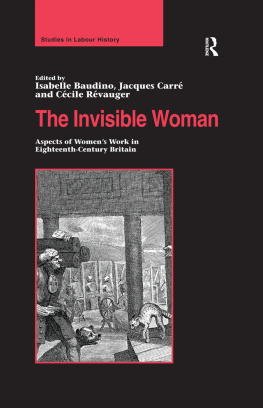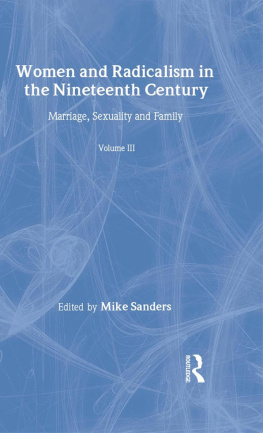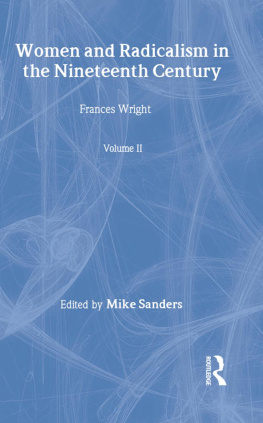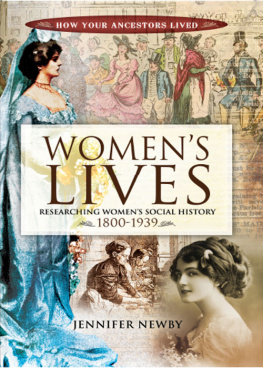The Invisible Woman
The Invisible Woman
Aspects of Women's Work in Eighteenth-Century Britain
Edited by
Isabelle Baudino
Ecole Normale Supieure Lyon, France
Jacques Carr
Universit, Paris IV-Sorbonne, France
Ccile Rvauger
University of Bordeaux III, France
First published 2005 by Ashgate Publishing
Published 2016 by Routledge
2 Park Square, Milton Park, Abingdon, Oxon OX14 4RN
711 Third Avenue, New York, NY 10017, USA
Routledge is an imprint of the Taylor & Francis Group, an informa business
Copyright Isabelle Baudino, Jacques Carr and Ccile Rvauger 2005
The editors have asserted their moral right under the Copyright, Designs and Patents Act, 1988, to be identified as the editors of this work.
All rights reserved. No part of this book may be reprinted or reproduced or utilised in any form or by any electronic, mechanical, or other means, now known or hereafter invented, including photocopying and recording, or in any information storage or retrieval system, without permission in writing from the publishers.
Notice:
Product or corporate names may be trademarks or registered trademarks, and are used only for identification and explanation without intent to infringe.
British Library Cataloguing in Publication Data
The invisible woman : aspects of women's work in eighteenth-century Britain. (Studies in labour history)
1. Women employees Great Britain History 18th century 2. Women Great Britain Social conditions 18th century
I. Baudino, Isabelle II. Carr, Jacques III. Rvauger, Ccile
331.4'0941'09033
Library of Congress Control Number: 2005922123
ISBN 13: 978-0-7546-3572-7 (hbk)
Labour history has often been a fertile area of history. Since the Second World War its best practionerssuch as E. P. Thompson and E. J. Hobsbawm, both Presidents of the British Society for the Study of Labour Historyhave written works which have provoked fruitful and wide-ranging debates and further research, and which have influenced not only social history but history generally. These historians, and many others, have helped to widen labour history beyond the study organised labour to labour generally, sometimes to industrial relations in particular, and most frequently to society and culture in national and comparative dimensions.
The assumptions and ideologies underpinning much of the older labour history have been challenged by feminist and later by postmodernist and anti-Marxist thinking. These challenges have often led to thoughtful reppraisals, perhaps intellectual equivalents of coming to terms with a new post-Cold War political landscape.
By the end of the twentieth century, labour history had emerged reinvigorated and positive from much introspection and external criticism. Very few would wish to confine its scope to the study of organised labour. Yet, equally, few would wish now to write the existence and influence of organised labour out of nations' histories, any more than they would wish to ignore working-class lives and focus only on the upper echelons.
This series of books provides reassessments of broad themes of labour history as well as some more detailed studies arising from recent research. Most books are single-authored but there are also volumes of essays centred on important themes or periods, some arising from major conferences organised by the Society for the Study of Labour History. The series also includes studies of labour organisations, including international ones, as many of these are much in need of a modern reassessment.
Chris Wrigley
British Society for the Study of Labour History
University of Nottingham
ISABELLE BAUDINO is lecturer in British cultural history at the Ecole Normale Suprieure in Lyon. She works on Georgian art and aesthetics. She has published Peinture et historicit: les mutations de la peinture d'histoire en Grande-Bretagne, 1707-1768 (Lille, 1997).
JACQUES CARR is professor of British cultural history at the Sorbonne (Universit Paris IV). He currently works on poverty and charity in the Georgian and Victorian ages. He has edited crire la pauvret: les enqutes sociales britanniques aux XIXe el XXe sicles (Paris, 1995) and Les Visiteurs du pauvre: anthologie d'enqutes britanniques sur la pauvret urbaine, XIXe-XXe sicles (Paris, 2000).
PIERRE DUBOIS is lecturer in British cultural history at the Sorbonne (Universit Paris IV). He works on music and aesthetics in the Georgian age. He has published L'Orgue dans la socit anglaise: thique et esthtique de la modration (Lille, 1997) and is currently editing Charles Avison's Essay on Musical Expression (to be published by Ashgate).
CHRISTINE HIVET is a lecturer in the English department at the University of Caen. She works on eighteenth-century literature and the condition of women. She has published Voix de femmes: roman fminin et condition fminine de Mary Wollstonecraft Mary Shelley (Paris, 1997).
SVERINE LANCIA is completing a doctoral thesis on the social status of late Georgian actresses.
GUYONNE LEDUC is professor of English literature at the Universit Charles de Gaulle in Lille. She has published L'Education des Anglaises au XVIIIe sicle: la conception de Henry Fielding (Paris, 1999) and edited L'Education des femmes en Europe et en Amrique du nord de la Renaissance 1848 (Paris, 1997).
GILLY LEHMANN is a professor in the English department at the University of Franche-Comt in Besanon. She is the author of several articles, in English and in French, on seventeenth and eighteenth-century cookbooks and cookery. She is a contributor to the New DNB and to the Oxford Companion to Food. Her most recent publication is The British Housewife: Cookery Books, Cooking and Society in Eighteenth-Century Britain (Prospect Books, 2003).
SOPHIE LOUSSOUARN is a lecturer in the English department at the Universit de Picardie in Amiens. She works on the education of women and on manners in the Georgian age.
MARION MARCEAU is a lecturer in the English department at the Universit of Paris IX-Dauphine. She has written a thesis on the life and work of the late eighteenth-century novelists Sophia and Harriet Lee.
CCILE RVAUGER is professor of British cultural history at the Universit Michel de Montaigne in Bordeaux. She works on the history of freemasonry and the history of ideas. She has published Le Fait Maonnique au XVIIIe sicle en Grande-Bretagne et aux Etats-Unis (Paris, 1990) and edited Pauvret et assistance en Grande-Bretagne, 1688-1834 (Aix-en-Provence, 1999).
MARIE-CLAIRE ROUYER-DANEY is professor of English at the Universit Michel de Montaigne in Bordeaux. She is a specialist of the Georgian stage and also works in women's studies.
DEBORAH SIMONTON teaches at the University of Aberdeen. Her recent publications include Gendering Scottish History (Glasgow, 1999) and A History of Women's Work, 1700 to the Present (London, 1998).
ANGELA J. SMALLWOOD is a senior lecturer in English literature at the University of Nottingham and was awarded a British Academy Readership to launch her research into eighteenth-century women playwrights. Her recent publications include: 'Women and Theatre' in V. Jones (ed.), Women and Literature in Britain 1700-1800 (Cambridge, 2000) and Plays of Elizabeth Inchbald, Vol. 6 of D. Hughes (gen. ed.), Eighteenth-Century Women Playwrights, (London, 2001).
MARIE-HLNE THVENOT-TOTEMS is professor of Scottish Studies at the Sorbonne (Universit Paris IV). She has collaborated in creating the CD-ROM 'Georgian Cities' (Paris, 2000) with a research team from the Sorbonne. She is the author of La dcouverte de l'Ecosse du XVIIIe sicle travers les rcits des voyageurs britanniques (Paris, 1990, 2 vols) and she has published many articles on eighteenth century Scotalnd.









